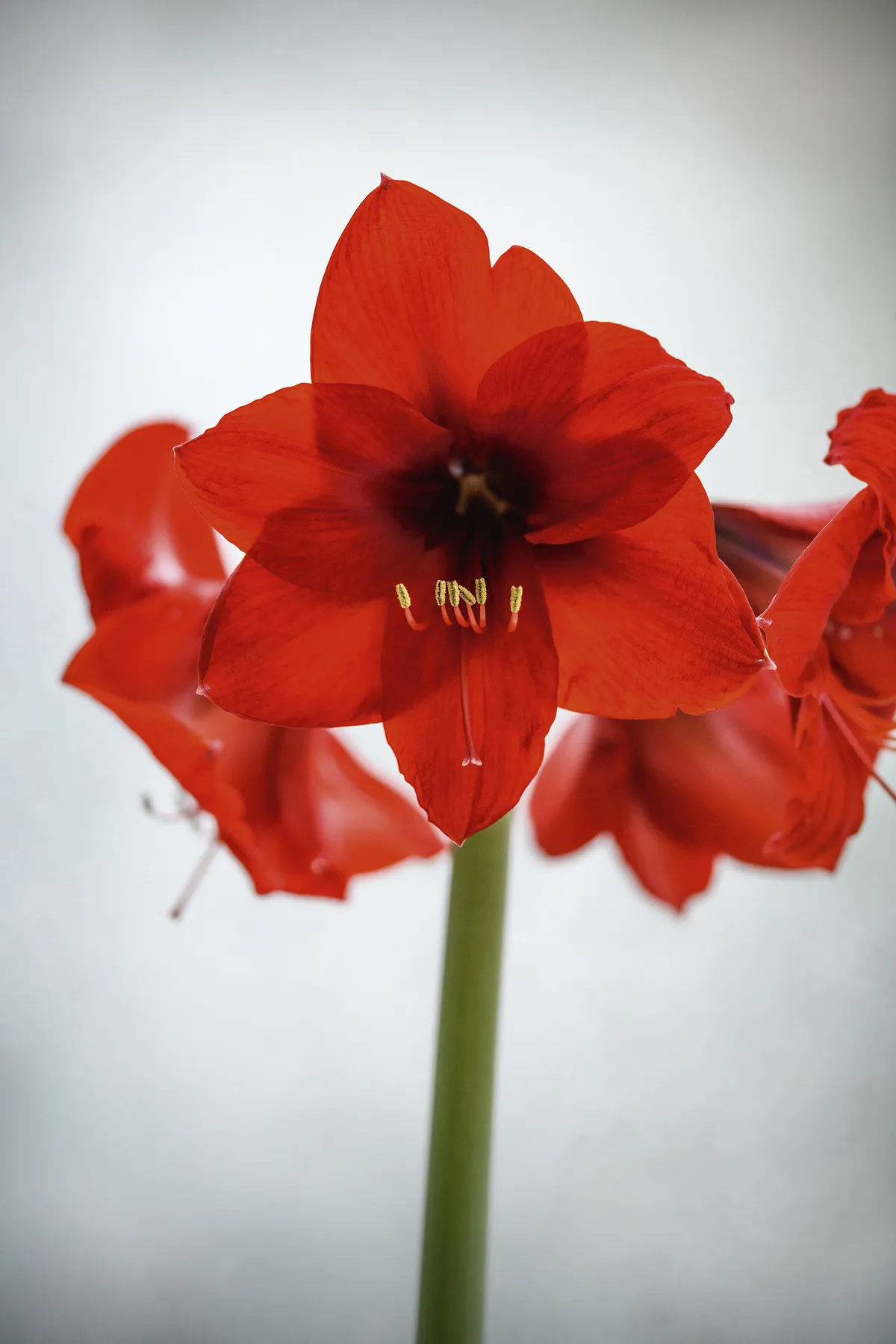Hippeastrums are giants among indoor bulbs. Their sturdy, leafless stems, more than half a metre in height, are topped with blaring trumpets of rich colour or cooler hues.
They are large-flowered bulbs, commonly grown indoors in the UK and often known as amaryllis. Hippeastrum, also known as amaryllis originate from the tropical and subtropical regions of South America. Hippeastrum flower in winter and spring. They measure between 40-60cm tall but can be taller in poor light. Conditions Frost free but good light, ideally 15-21oC. Hardiness RHS H2, USDA 8a-10b.
Jump to
What is the difference between amaryllis and hippeastrum?
Hippeastrums are often called amaryllis, an old name that now only applies to a small genus of South African bulbs, best known for the hardy, autumn- flowering Jersey lily, Amaryllis belladonna. But the common name has stuck and many people still refer to Hippeastrum as amaryllis.
How to grow Hippeastrum or amaryllis
Easy to package and simple to coax into flower, amaryllis bulbs make popular gifts. Many of us will have received one, maybe for Christmas, because they can be forced to bloom early. They can be ordered from summer onwards for planting any time from October to January. They take around six to eight weeks to flower indoors.
Newly purchased amaryllis bulbs are ready to go when they arrive – all you need to do is pot them up (the compost is often provided) and water them. They need good light, especially in the short days of winter, and some warmth, ideally about 21°C, so a windowsill is perfect. The pot only needs to be a little larger than the bulb itself and the top two thirds of the bulb should be left exposed above the soil. Water sparingly at first but when the leaves start to grow, increase watering – they do not want to dry out at this stage. They should flower six to eight weeks after potting. Turn the pot regularly as the flower stem grows to prevent it bending towards the light.
Read more about planting amaryllis bulbs.
How to care for Hippeastrum, or amaryllis bulbs after flowering
Many bulbs are disposed of after they have flowered, which is a shame as keeping them going requires only a little effort. With the right care, amaryllis can be encouraged to re-flower for many years. If it is kept somewhere frost-free, it may flower again, this time in spring or early summer. This is the plant reverting to its normal behaviour, showing signs of its origins. These showy plants have come from species that grow wild in the tropics and subtropics of South America. There are about 100 species of these mostly tender or half-hardy plants but the large, extravagant bulbs you can buy now are the result of over 220 years of breeding.
- Continue watering through spring and summer to keep the strap-like leaves green and healthy, providing food for the bulb. Be careful not to overwater but don’t let them dry out either. Apply a balanced fertiliser a couple of times a month to increase the chances of the bulb having the energy to flower again.
- Amaryllis can be left outside for the summer but avoid a position in bright sunlight. In late summer, reduce watering and then stop completely, so that the soil dries out. The leaves will die back and once brown, they can be cut off at the tip of the bulb.
- Keep the bulb dry and cool but frost-free for two or three months. Then pot it up again and start watering to start them into growth. You can delay flowering by keeping the bulb cool and dry until early spring. It can then be brought into growth when the days are longer – the extra light will help keep the plants sturdier and the stem is less likely to become too elongated.
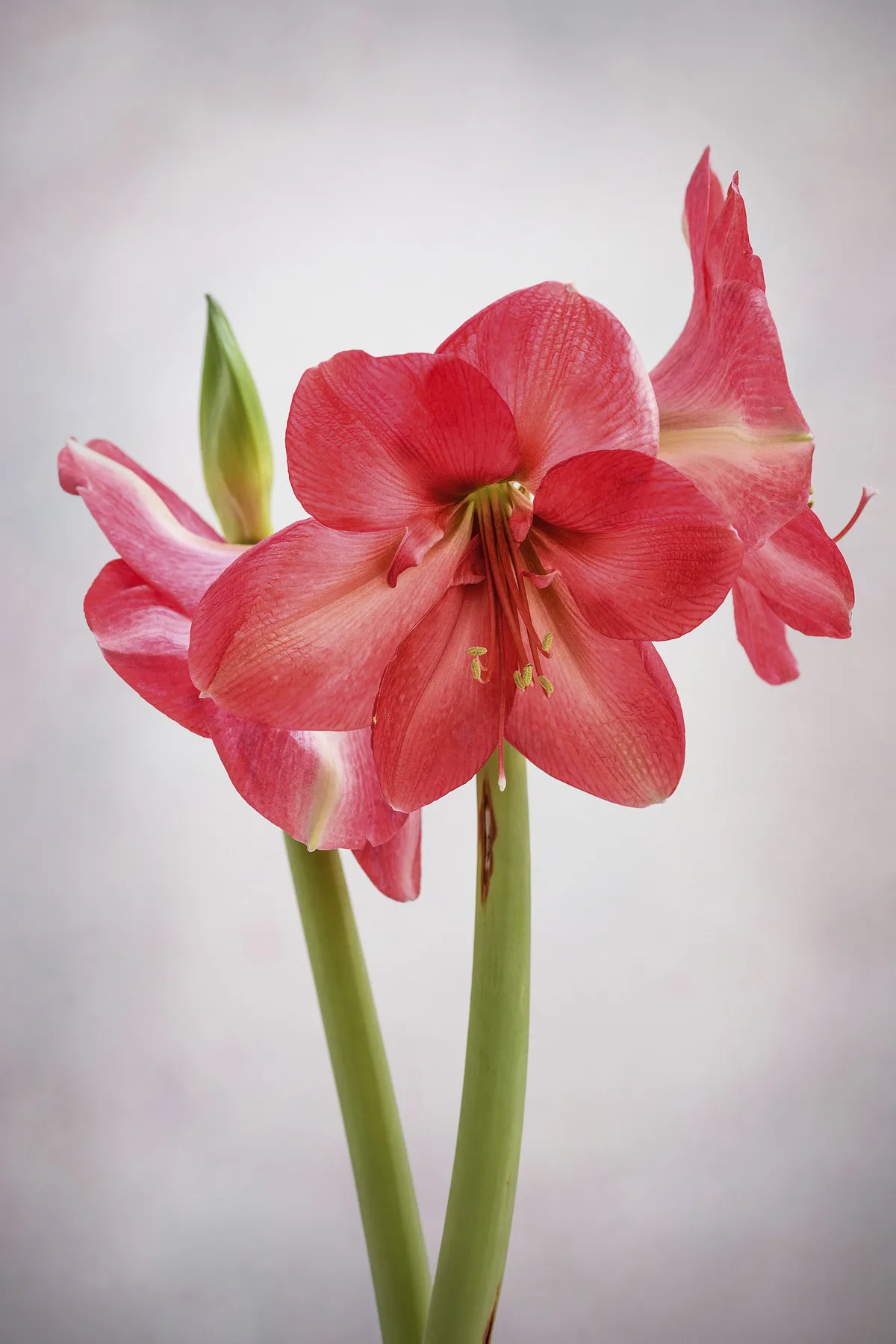
How to propagate amaryllis
Types of amaryllis to try
The main centre for commercial Hippeastrum breeding is the Netherlands, with other centres around the world. There is still an emphasis on bigger, brighter flowers and some of the most popular belong to the Galaxy Group. These have flowers at least 16cm across and come in many vibrant colours, such as the magenta-pink of Hippeastrum ‘Lagoon’ and the striped, red-and-cream Hippeastrum ‘Clown’.
Not all amaryllis are so vivid. There are whites of course, such as Hippeastrum ‘Christmas Gift’. But it is in the Spider Group, bred from Hippeastrum cybister, where we find some of the most elegant forms. These have narrow petals giving the flowers a more modest appearance and a touch of sophistication.
There are few species available to buy but the one that is most easily obtained in the UK is the Brazilian species Hippeastrum papilio, more commonly known as the butterfly amaryllis. The pointed petals are creamy green with delicate markings of burgundy. Stunning in its own way and a reminder that nature often knows best.
Getting the bulb to flower again may be satisfaction enough but if you want to increase your stock, try propagating them. can be grown from seed but it might take over six years to reach flowering size. When they do flower it is unlikely that they will match the parent plant as these are complex hybrids. An easier way to propagate the bulbs is from offsets. It will be obvious because an extra set of leaves will appear. In the winter, carefully pull the offset from the main bulb and pot it up separately. It will flower in three or four years.
The best amaryllis to grow
Hippeastrum ‘Evergreen’
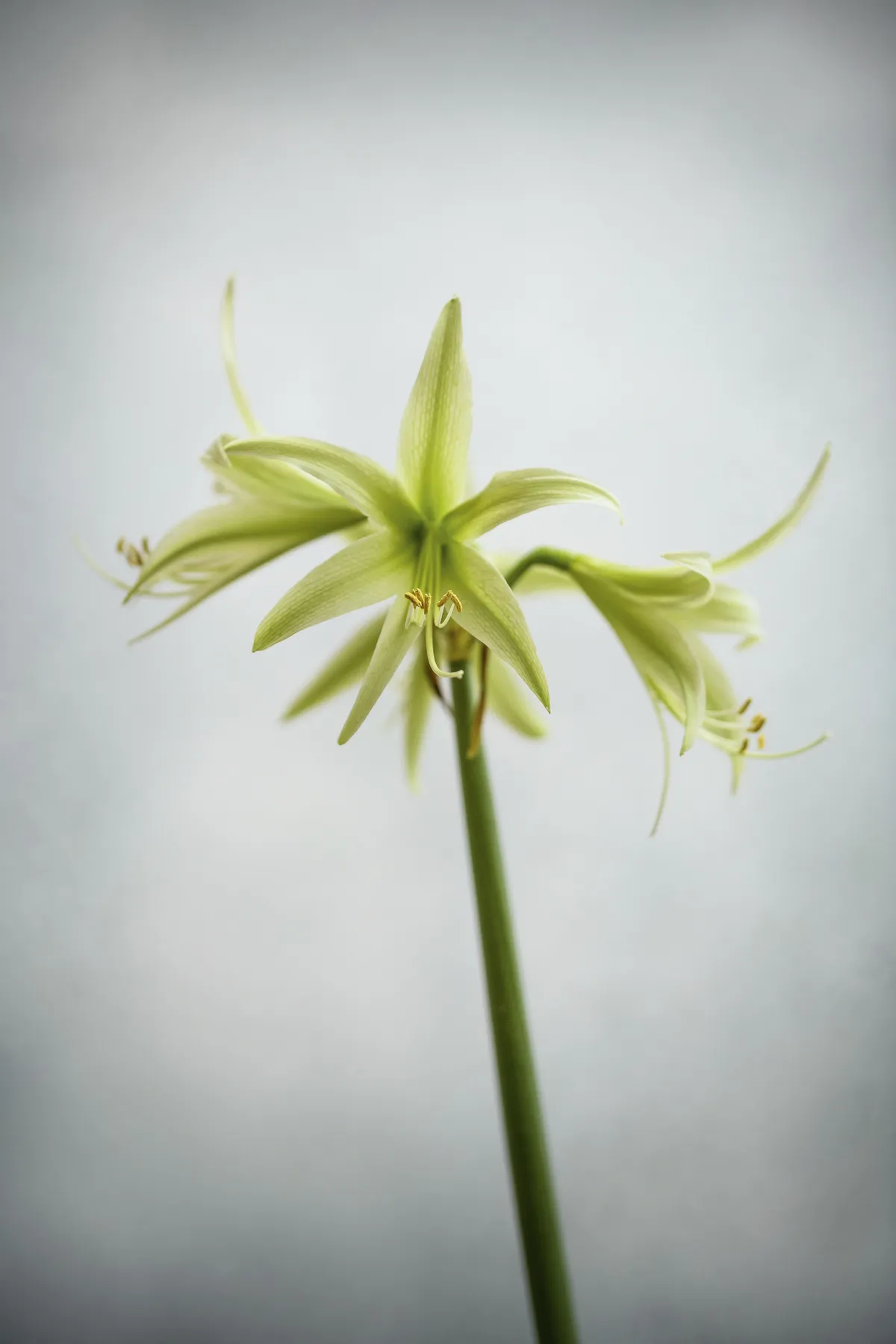
The narrow, flaring petals are lime green, becoming darker towards the centre of the flower, from where the green stamens protrude. It belongs to the Spider Group and must be one of the most subtle and stylish amaryllis. 50cm. AGM. RHS H2.
Buy Hippeastrum 'Evergreen' from Crocus
Hippeastrum ‘Lagoon’

The huge, rich-pink flowers with wide petals make this amaryllis really stand out. Often producing two stems, this cultivar has all the characteristics expected from the Galaxy Group. 60cm. AGM. RHS H2.
Buy Hippeastrum 'Lagoon' from Crocus
Hippeastrum ‘Exotic Star’
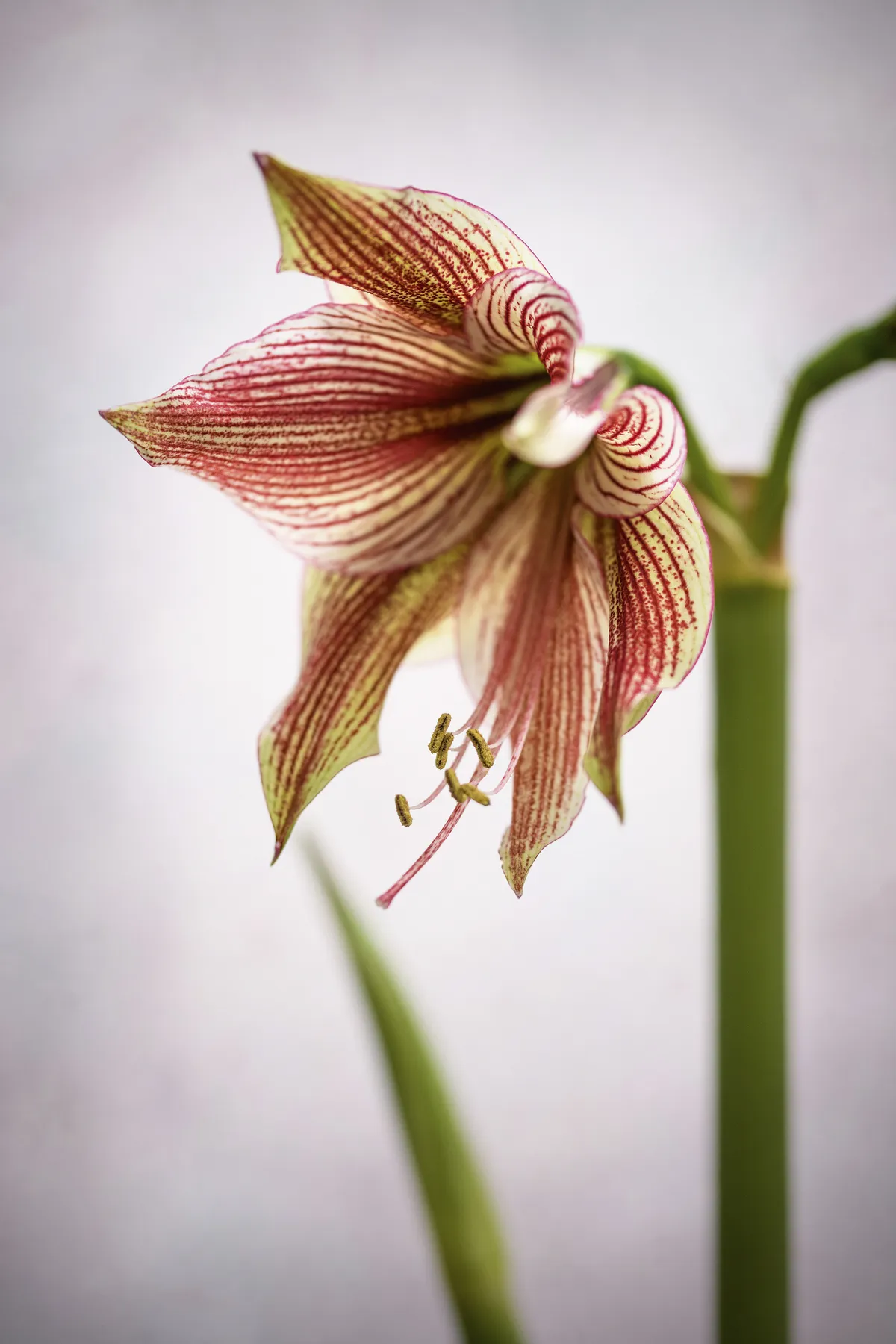
One of the Butterfly Group, its maroon-red markings over creamy-green petals resemble those on the flowers of the butterfly amaryllis, Hippeastrum papilio, which has undoubtedly influenced the breeding of this cultivar. It often produces two or three stems per bulb. 60cm.
Buy Hippeastrum 'Exotic Star' from Bulbi
Hippeastrum ‘Clown’
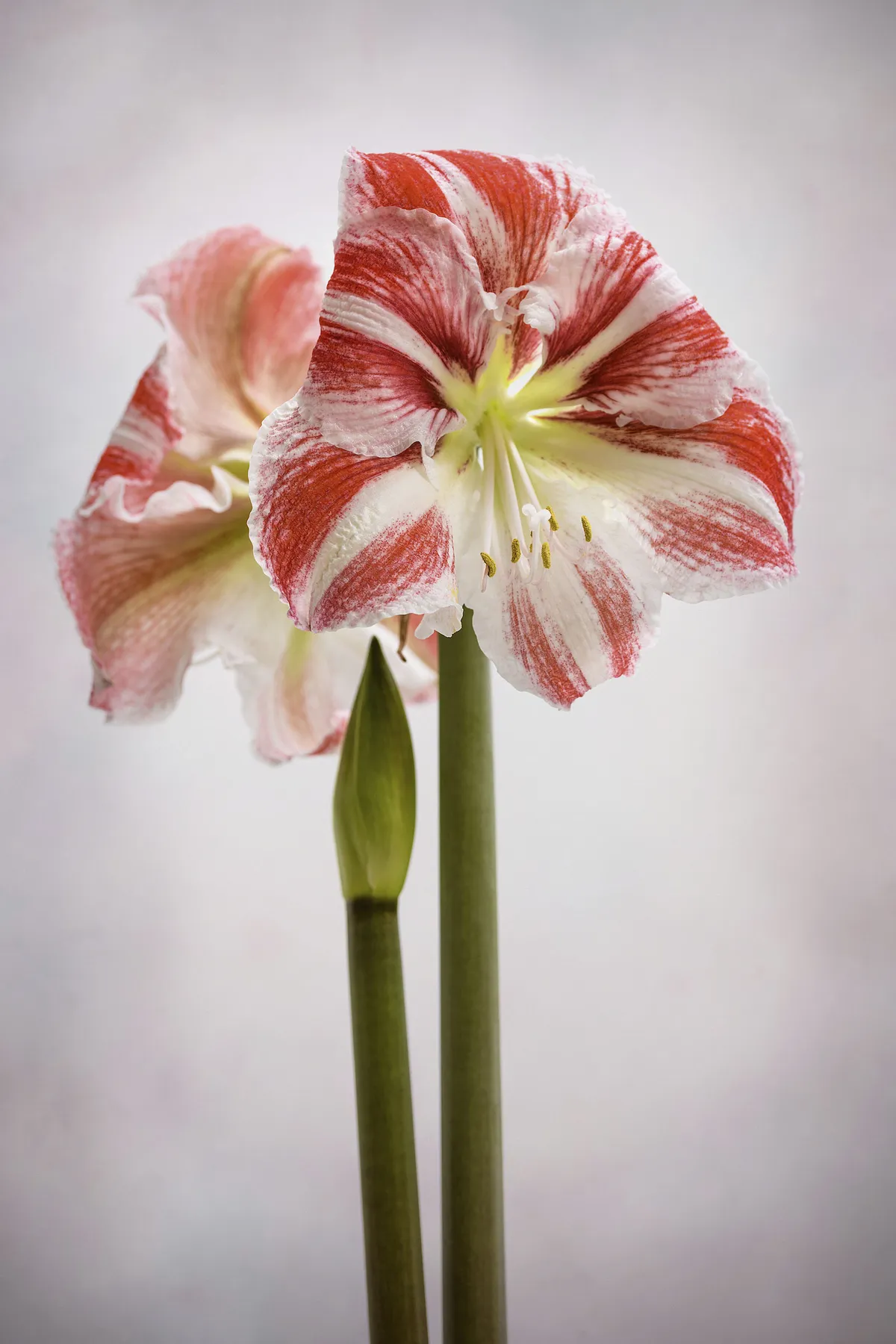
Another large-flowered form in the Galaxy Group, this has been a popular choice for many years. Sometimes called the candy cane amaryllis due to the pale, red-and- white striped flowers. 60cm. AGM. RHS H2.
Buy Hippeastrum 'Clown' from J Parker's
Hippeastrum ‘Bogota'
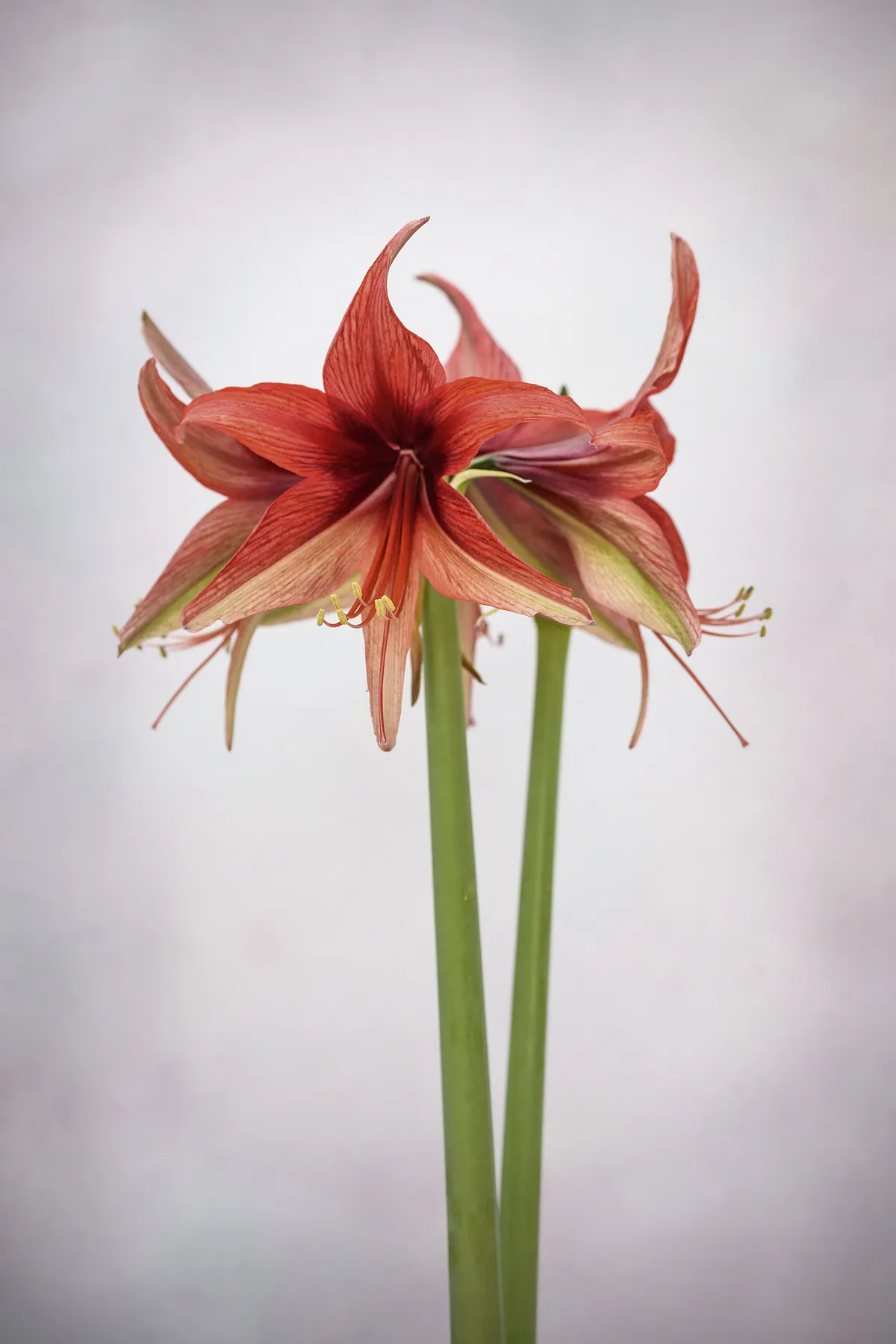
The slender, slightly recurved petals are typical of the Spider Group of cultivars. The bright scarlet to coral red flowers are flushed with green on the reverse and each bloom is around 12cm across. 50cm.
Buy Hippeastrum 'Bogota' from Crocus
Hippeastrum ‘Snow White’
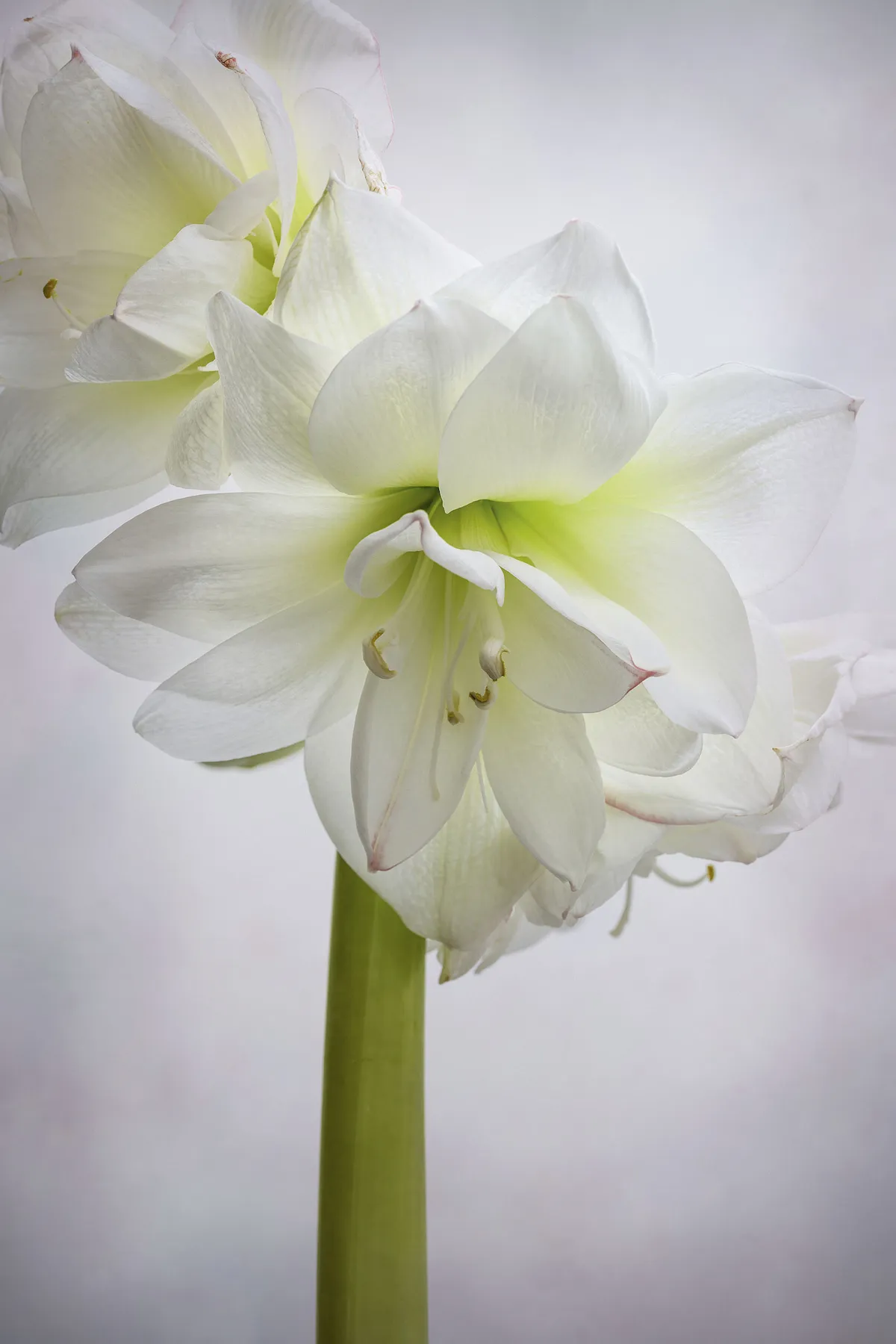
A double-flowered amaryllis with multiple petals and heavy blooms. The stems will need staking to take the flowers’ weight but there’s no denying this is one of the most voluptuous cultivars around. 60cm.
Hippeastrum ‘Barbados’
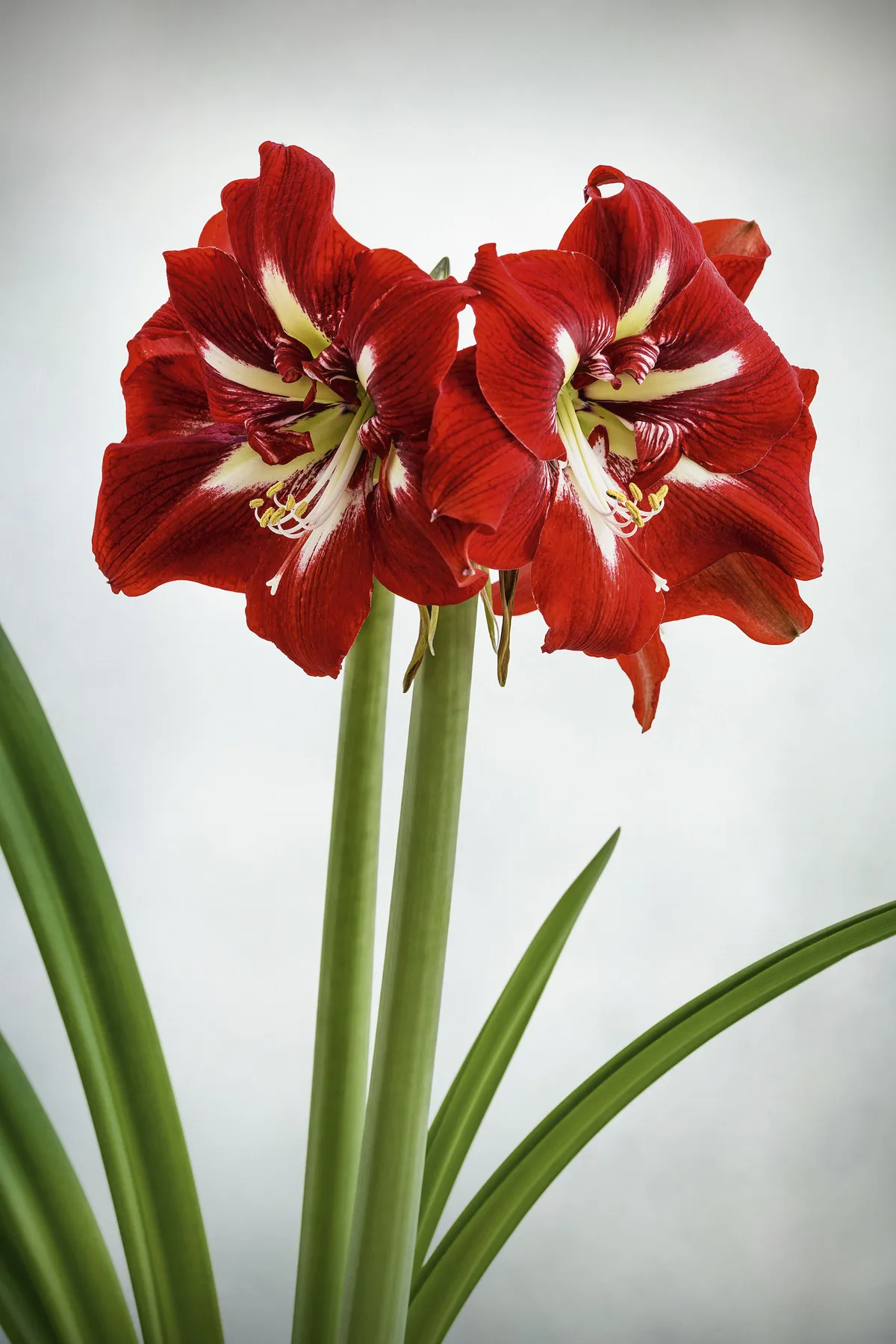
Originally bred for the cut-flower trade, the deep-red flowers with a white cross in the centre are the perfect colours for a Christmas bouquet. This striking, large- flowered form is in the Galaxy Group. 60cm.
Buy Hippeastrum 'Barbados' from Direct Bulbs
Hippeastrum ‘Picotee’
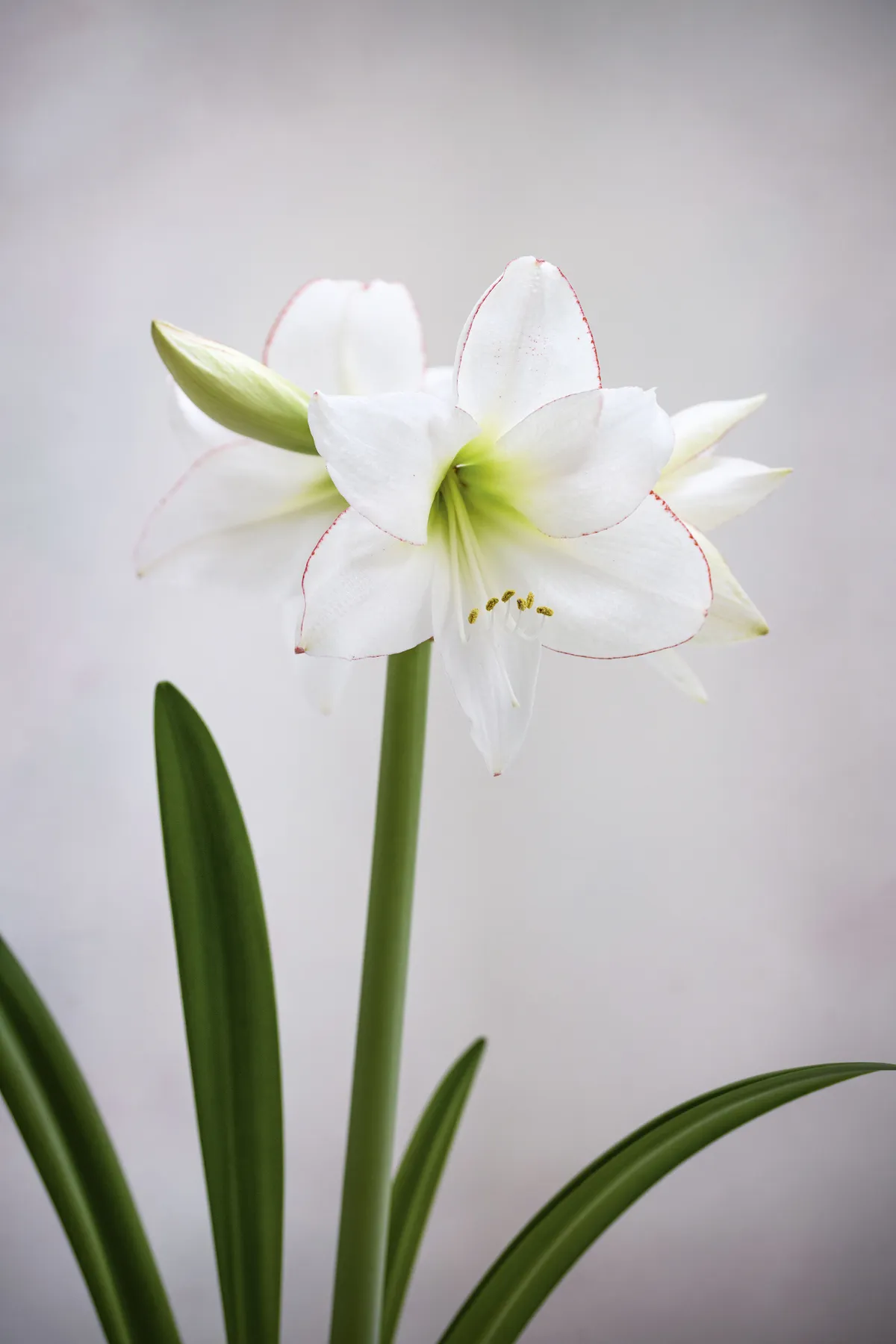
With its pure-white petals delicately edged with a thin, red line, this elegant cultivar is one of the more sophisticated of the larger- flowered cultivars. It is one of the Diamond Group, which display flowers up to 16cm across. 60cm. AGM. RHS H2, USDA 8a-11†.
Buy Hippeastrum 'Picotee' from Crocus
Hippeastrum ‘Lemon Lime’
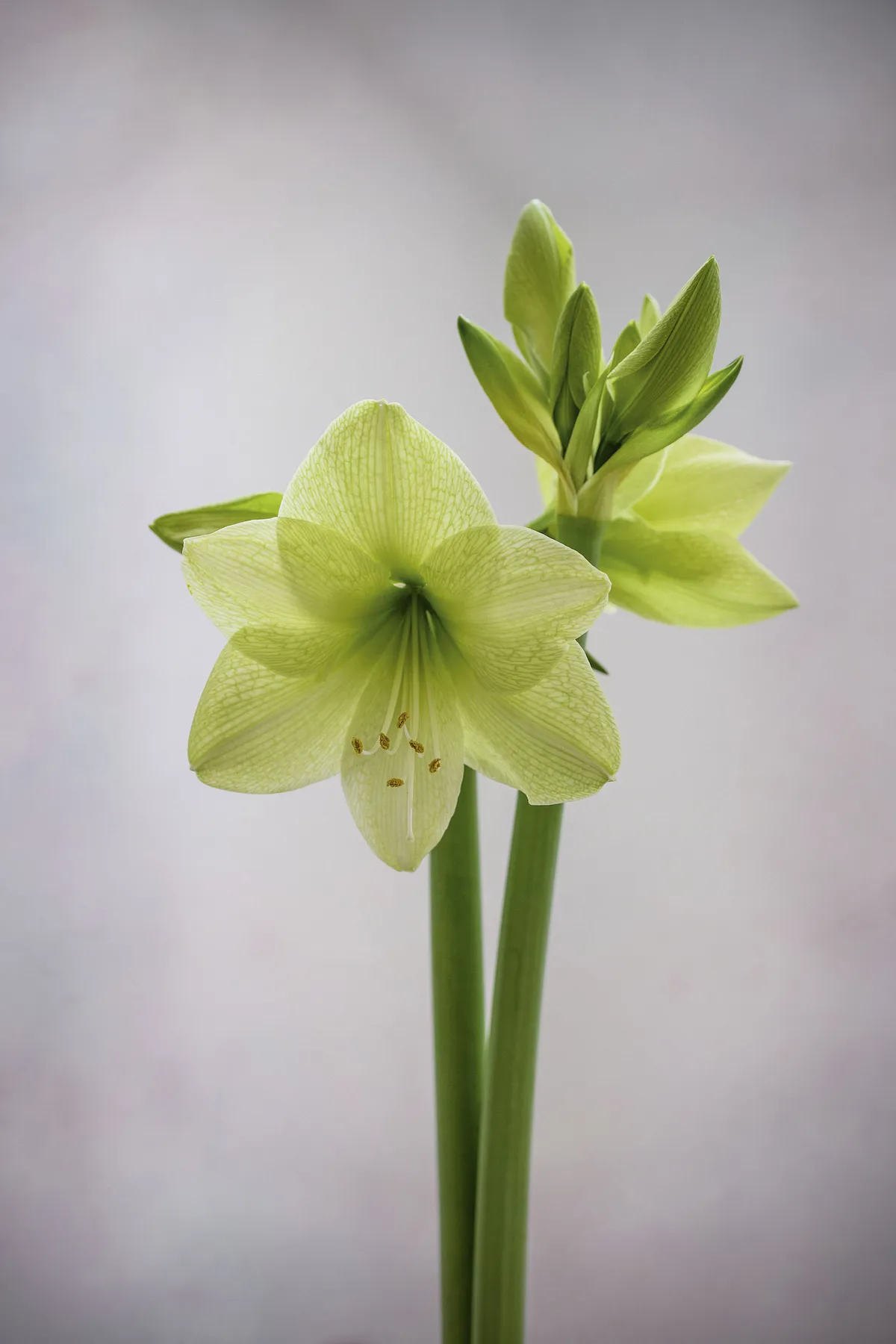
Belonging to the Diamond Group, which has slightly smaller flowers than the Galaxy Group, but the pale-green blooms can be used in combination with white-flowered amaryllis, to create a cool- coloured display. 50cm.
Buy Hippeastrum 'Lemon Lime' from J Parker's
Hippeastrum papilio
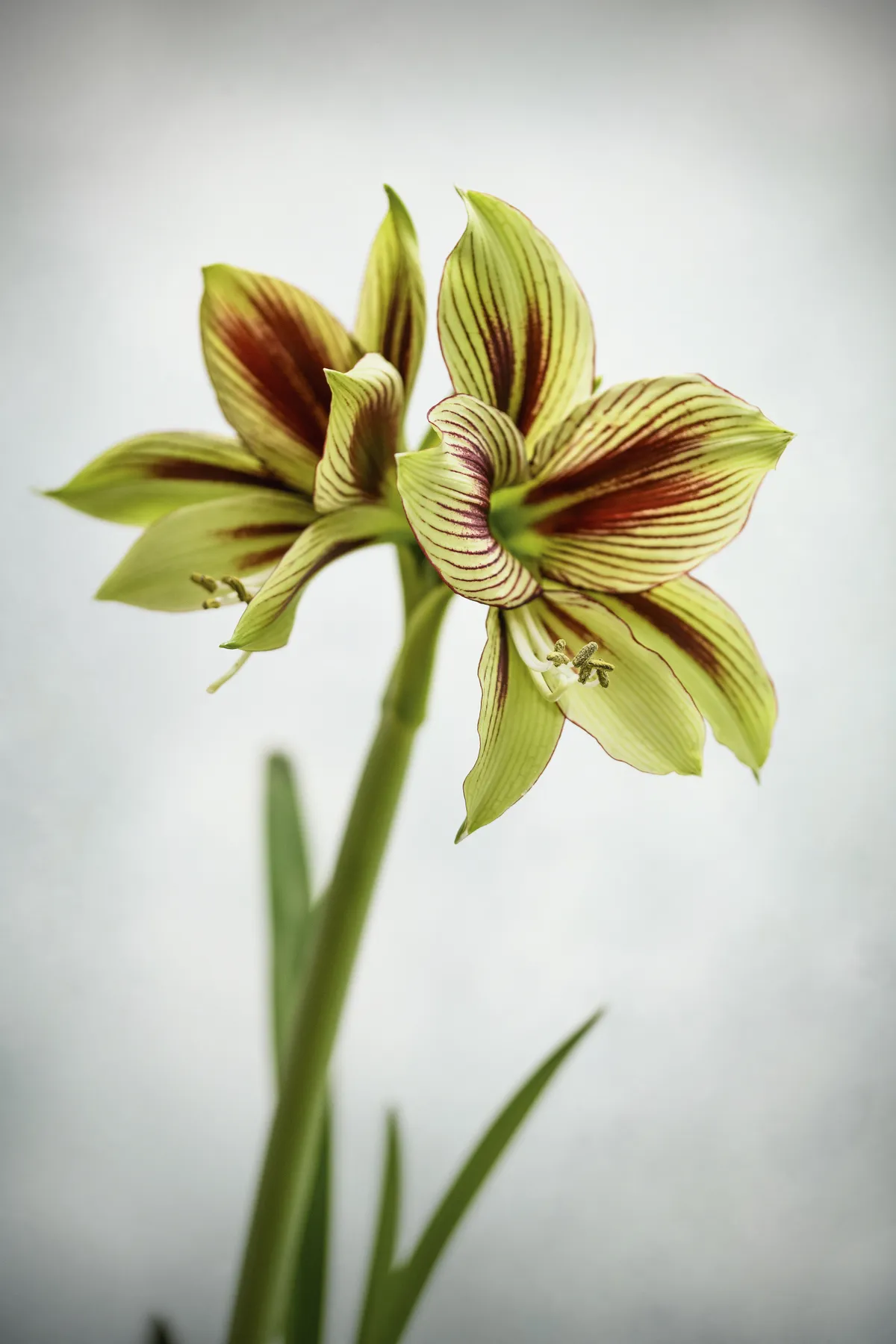
The butterfly amaryllis grows wild in southern Brazil. The intricately marked petals are wide but elegantly pointed. It often grows several stems per bulb and is shorter than most cultivars. This is a semi-evergreen plant that may flower twice in one year. 45cm. RHS H2.
Buy Hippeastrum papilio from Crocus
Hippeastrum 'Mont Blanc'
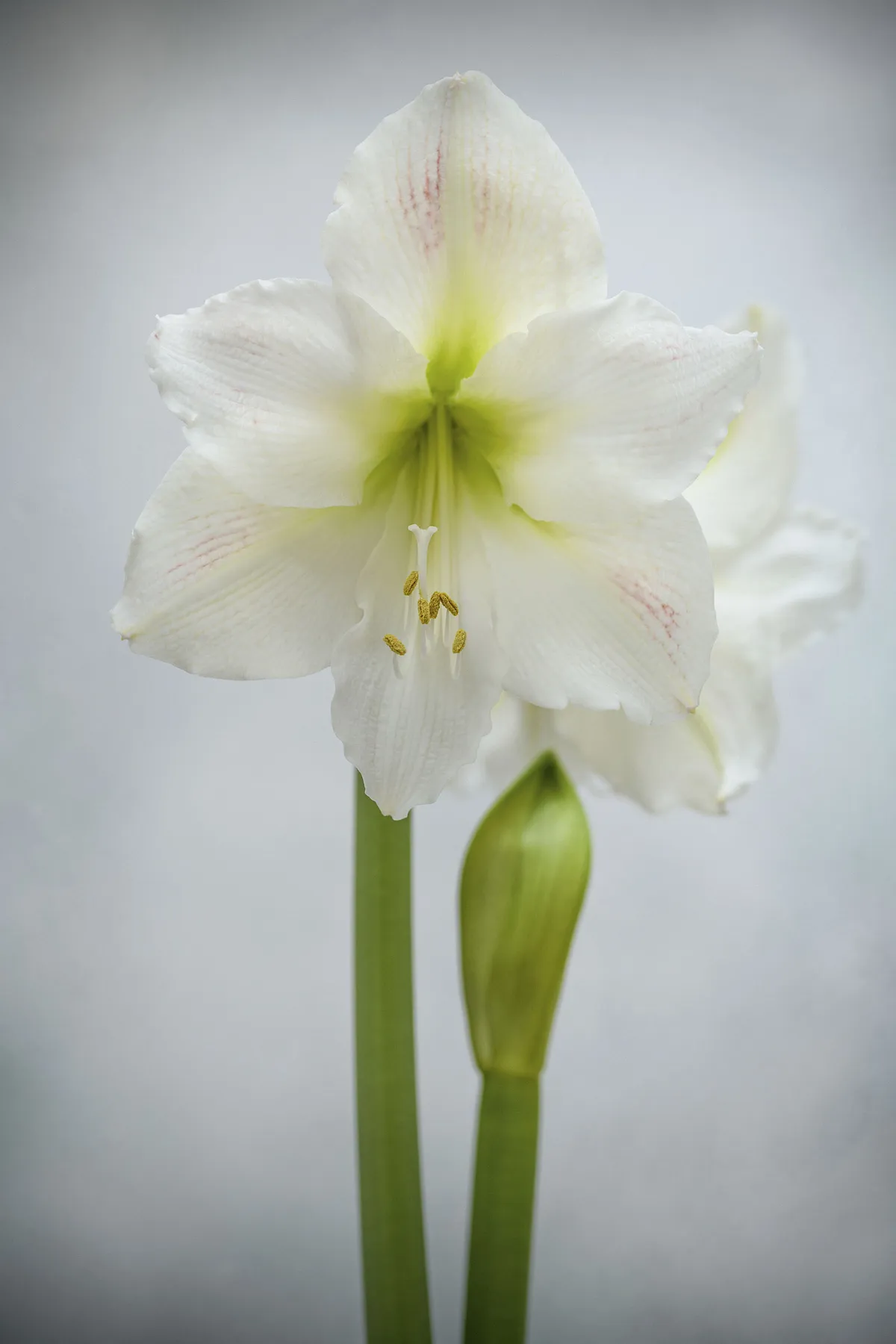
This is one of the older Dutch cultivars, first registered in 1962 but is still widely available and a popular choice in the Galaxy Group. The large, creamy-white flowers have a green throat. 60cm.
Buy Hippeastrum 'Mont Blanc' from Farmer Gracy
Hippeastrum 'Christmas Gift'
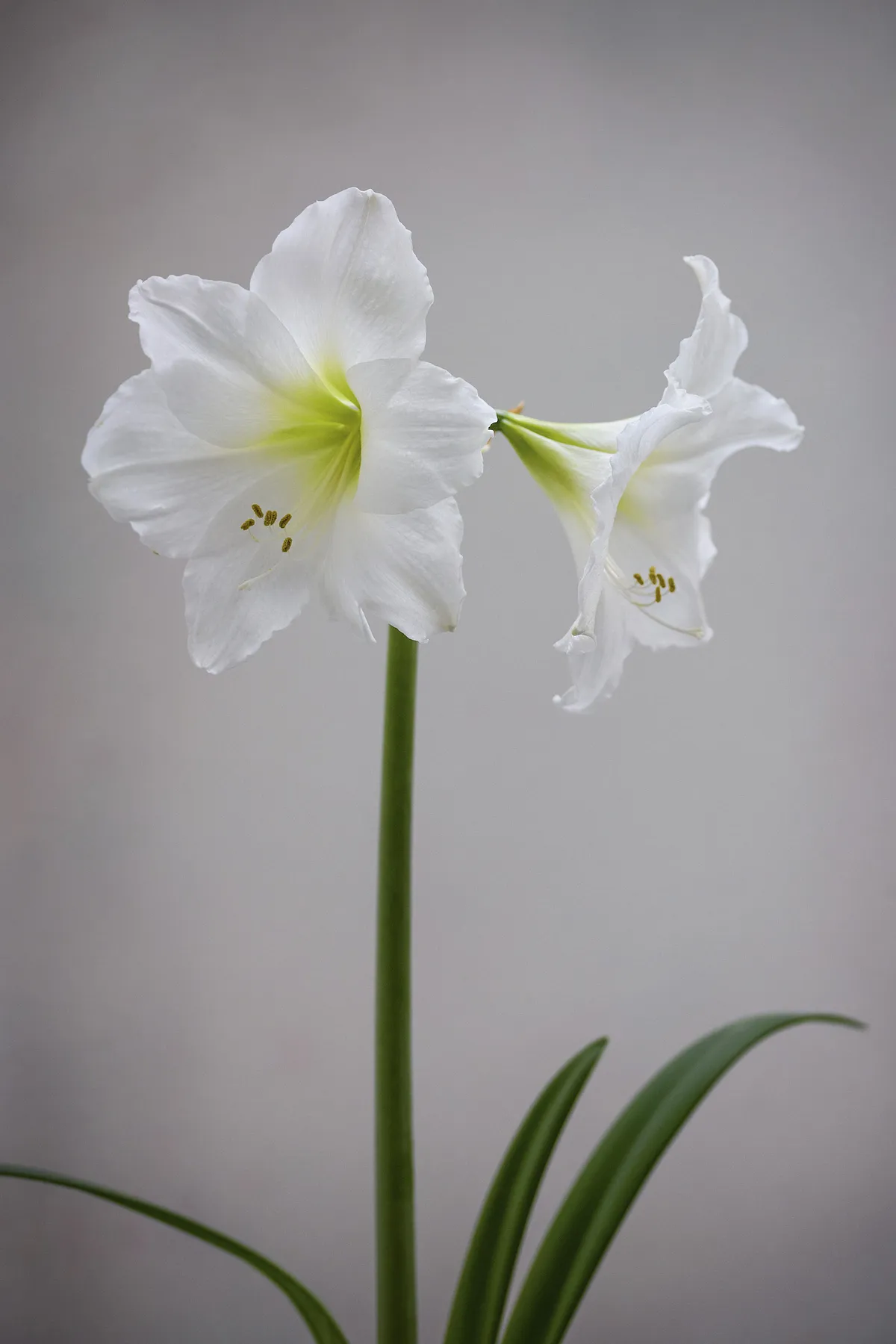
There is no doubting the intended market for this cultivar. Like most amaryllis, they are treated to bloom early in the year and the large flowers, typical of the Galaxy Group, are pure glistening white with a green throat. 60cm.
Buy Hippeastrum 'Christmas Gift' from Crocus
Hippeastrum 'Tierra'
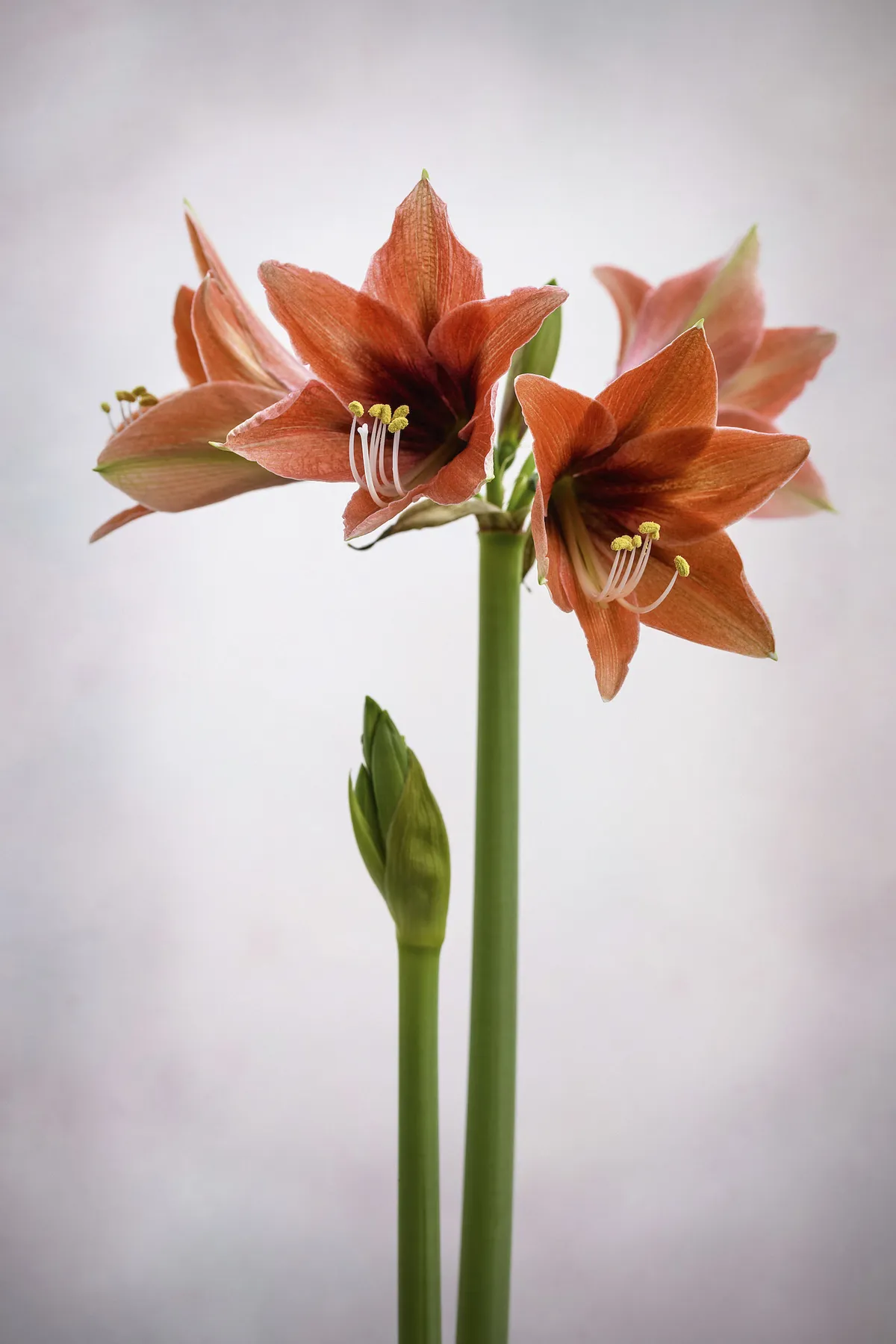
A newcomer that is often sold under the name ‘Terra Mystica’, this Diamond Group amaryllis has distinctive terracotta-pink flowers, with a dark purple throat and the finest of white edges to the petals. 50cm.
Buy Hippeastrum 'Terra Mystica' from Crocus
Hippeastrum 'Red Lion'
With its extremely large, rich-red flowers, this amaryllis from the Galaxy Group is a real showstopper. The largest bulbs can produce three or sometimes four stems, each with four or five blooms. 60cm. AGM.
Buy Hippeastrum 'Red Lion' from Crocus
Alys Fowler shares her favourite amaryllis, or Hippeastrum, with delicate blooms in a range of subtle tones.
Hippeastrum ‘La Paz’
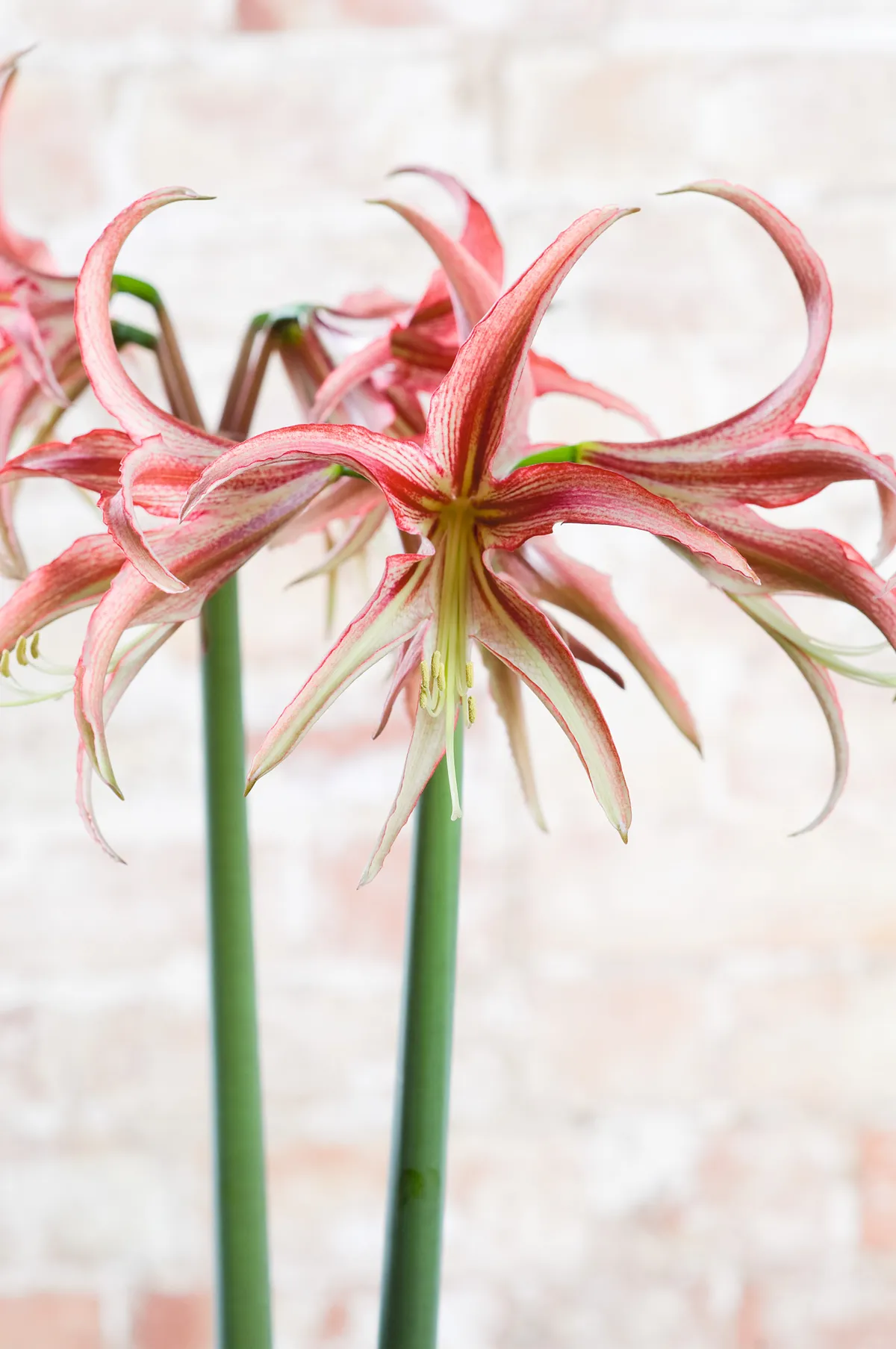
Hippeastrum 'La Paz' has a long, vigorous stem with spidery, frilly-edged petals. The petals are a soft pink with dark outer edges. The colours seem slightly muddied compared to other ‘cybister’ types – but it’s certainly unusual.
Buy Hippeastrum 'La Paz' from Peter Nyssen
Hippeastrum 'Misty'
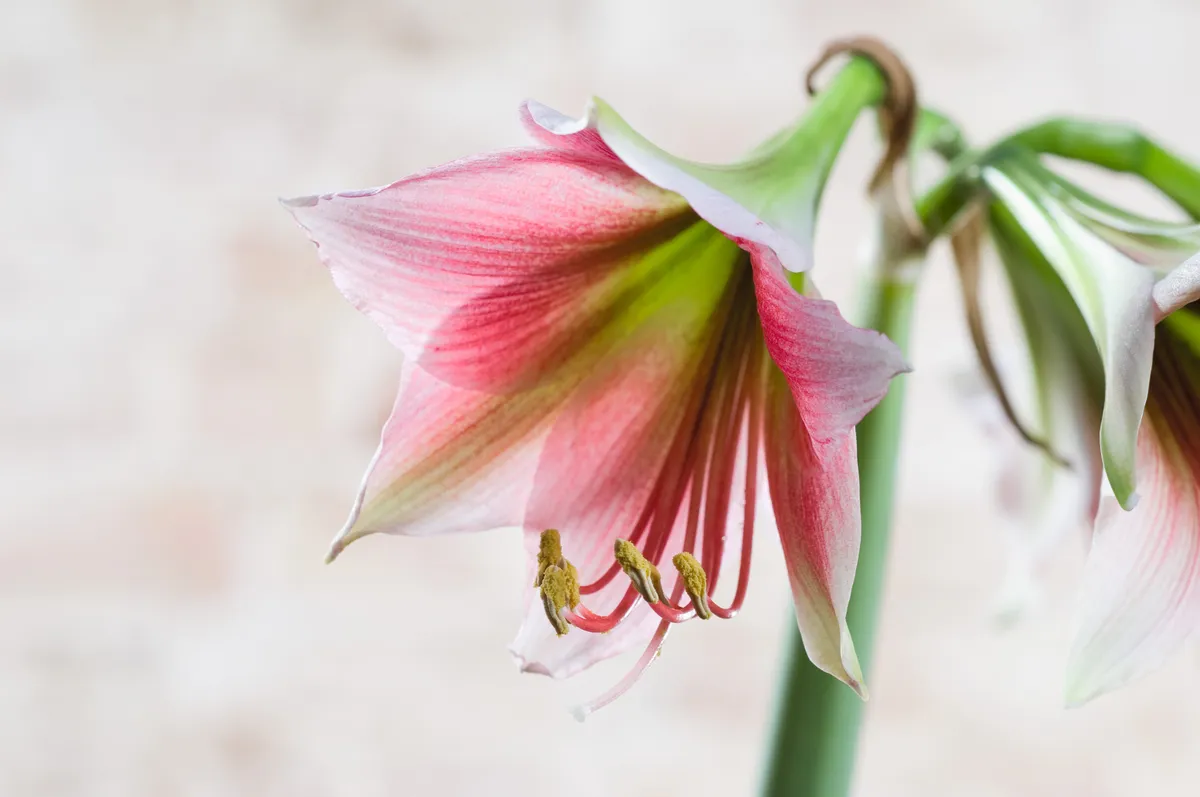
A traditional amaryllis trumpet, but smaller and more refined than most. This amaryllis has a lovely, subtle fragrance and a green throat.
Hippeastrum 'Rosario'
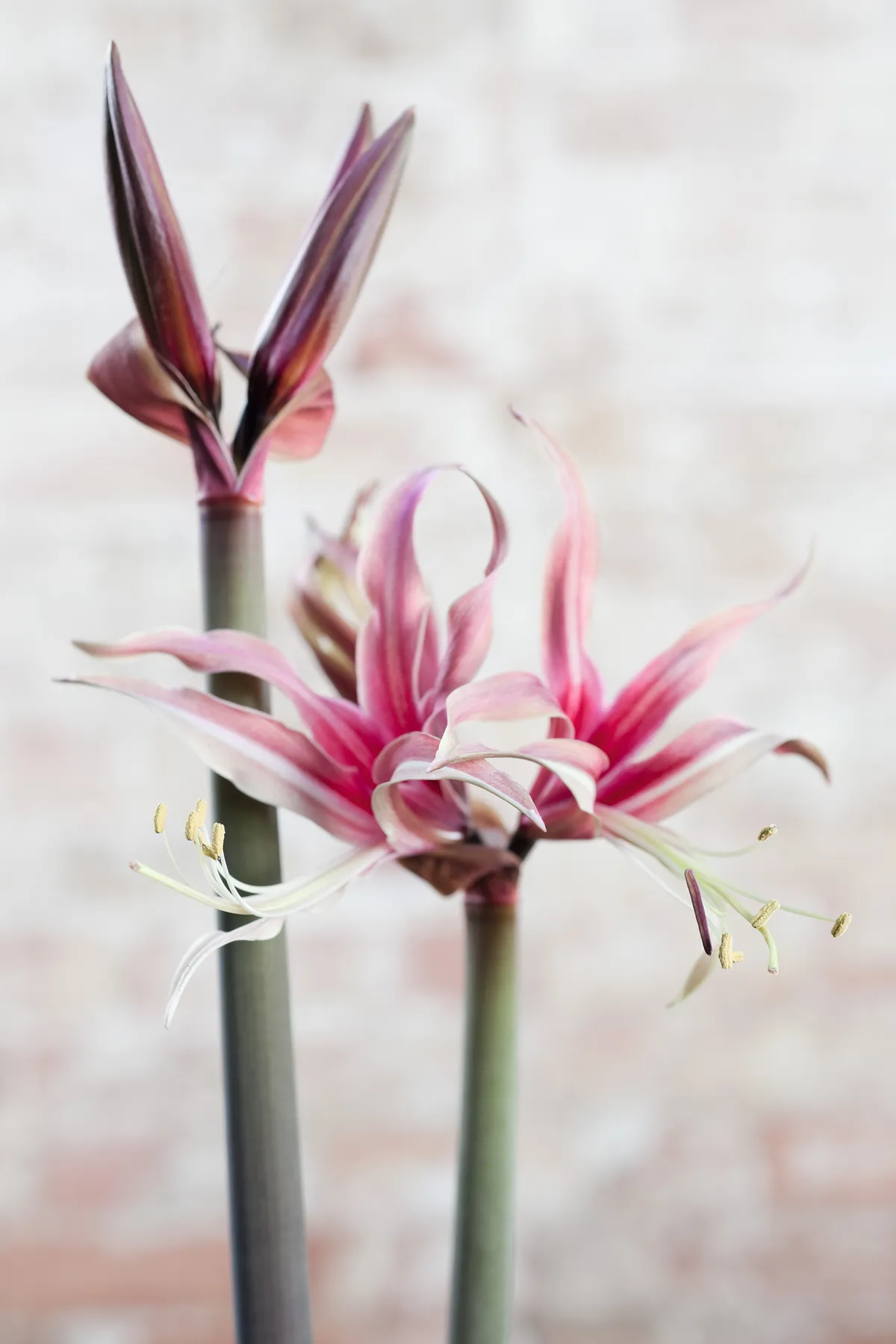
This amaryllis has unusual streaking on its spidery petals. It tends to be slow to get going and less vigorous than some.
Hippeastrum 'Tango'
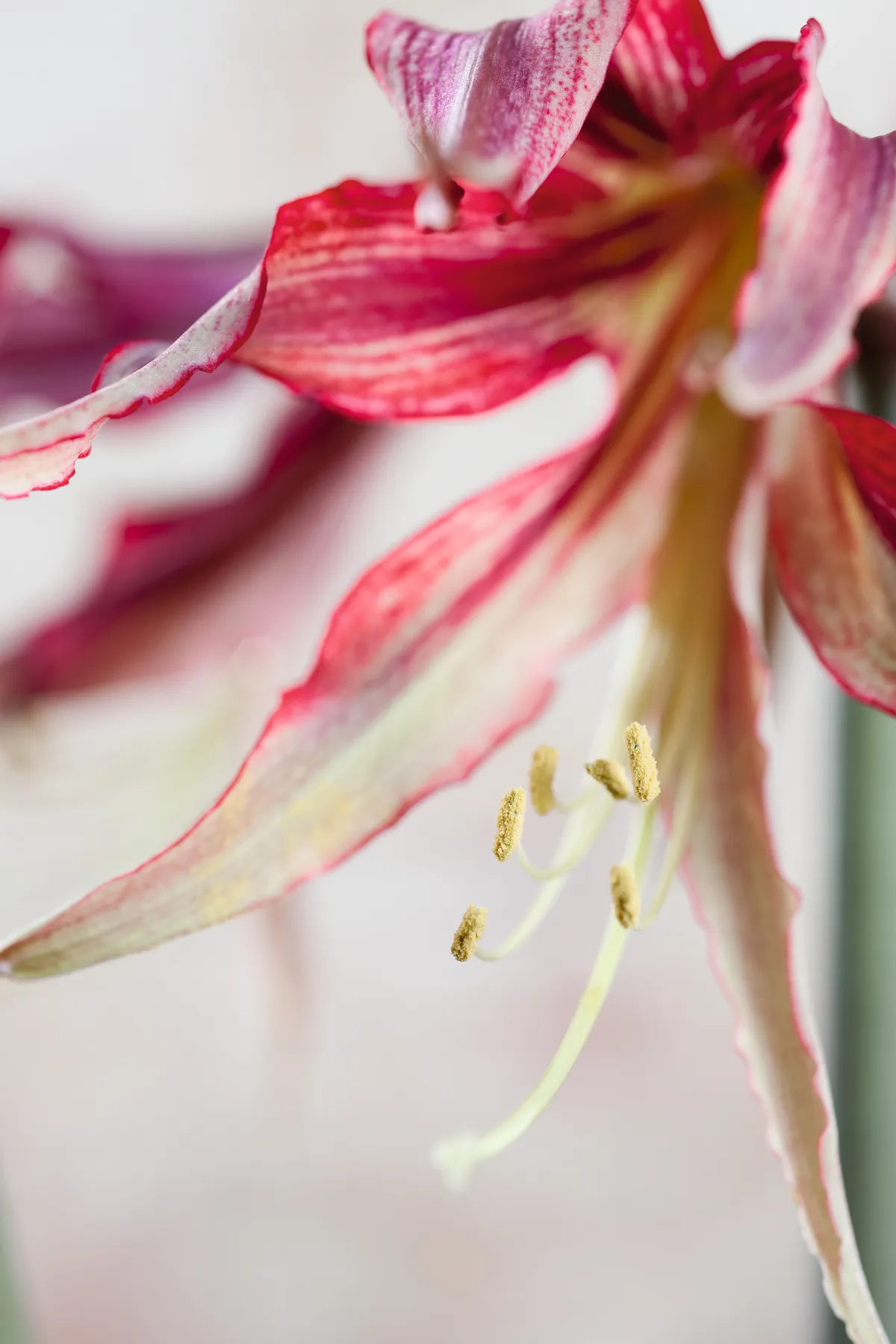
Amaryllis 'Tango' is unusual, boasting stunning cherry-coloured, streamer-like petals with a splash of green. The colour combination isn’t as clear as ‘Rosario’, but you’ll get more flowers per stem. A reliable starter variety.
‘Emerald’
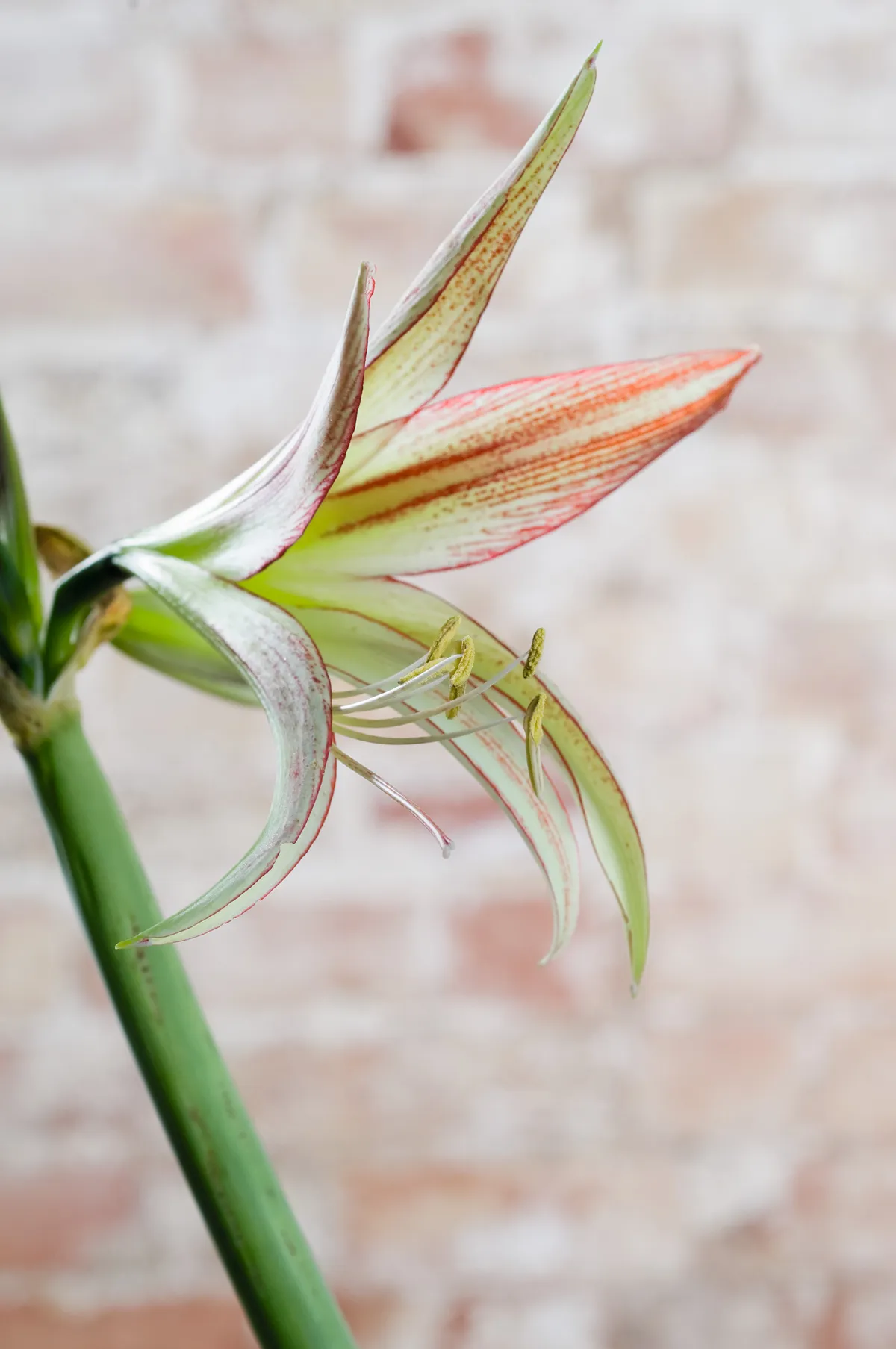
Despite its name, this amaryllis is more red than green. The insides of its petals look hand painted.
Buy Hippeastrum 'Emerald' from Jacques Amand
‘Merengue’
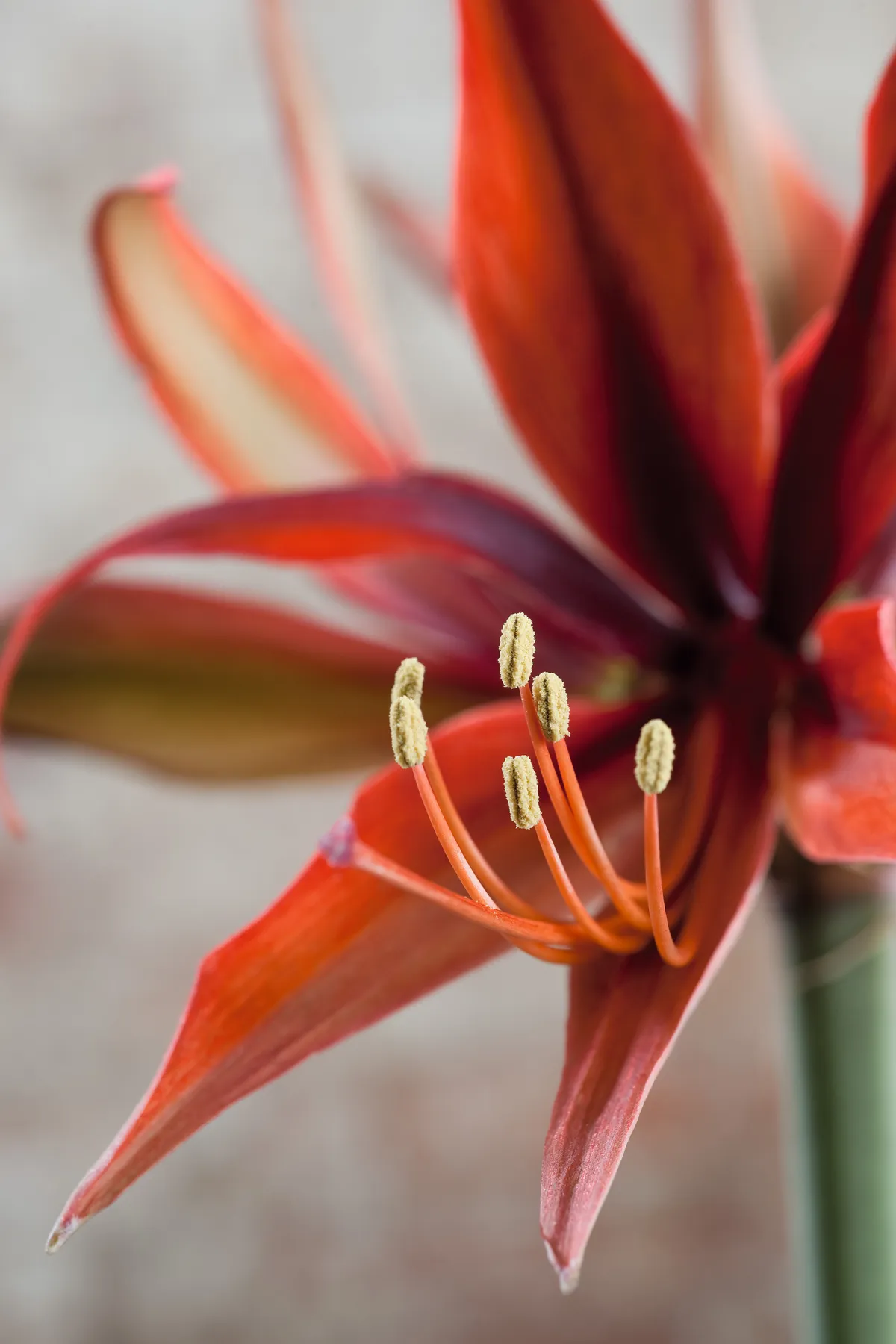
Amaryllis 'Merengue' has elegant, pointed petals. I love the terracotta throats of the plentiful flowers – like a 1970s bathroom scheme, but in a good way. My favourite.
